Author: Deniz Kirkali
Across Turkey, a quiet yet powerful transformation is taking place as artist residencies increasingly emerge outside the country’s major cultural hubs. From Antalya to İzmir, independent initiatives such as Hür Adalar and sezon are redefining how artists inhabit space, cope with memory, and create community. These artist-led programmes—born from personal, often intergenerational stories—offer models of care, resistance, and self-determination that challenge institutional norms and expand the geography of artistic practice across the country.
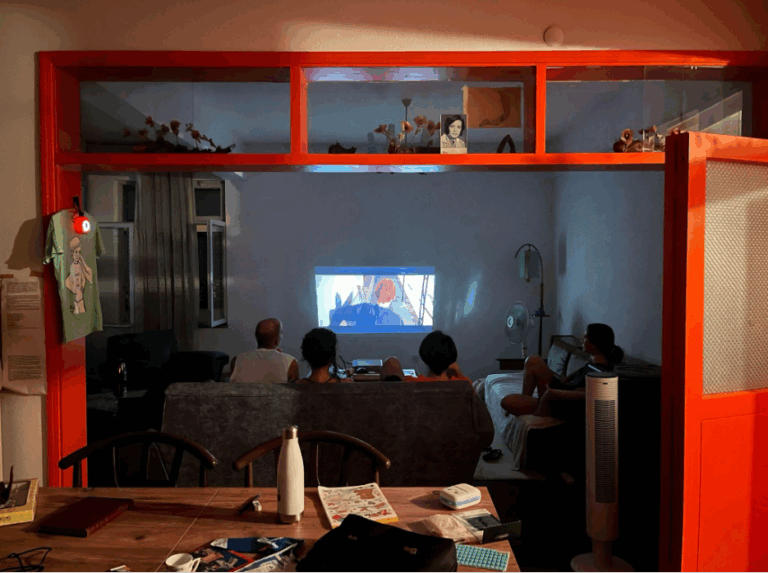
Artists watching The Man Who Fell To Earth – © Courtesy of Hür Adalar
In recent years, there has been a significant increase in artist-led residency programmes across Turkey—making culture livelier even outside of Istanbul. The lack of such spaces which led us to found Garp Sessions as I have previously written in detail for Reset! has now been replaced by the excitement of artist-run spaces which host artists and cultural producers in the so-called peripheral cities.
Making Loss Meaningful
Hür Adalar is a residency programme founded and run by artist Fatma Belkıs in her hometown of Antalya. After losing her grandmother in 2001 and her grandfather in 2010, Belkıs and her family acquired their flat. In 2011, she invited members of KABA-HAT, a collective she had been part of, to use the space as a live-in studio for ten days. After experiencing various ways of coming together and thinking with other artists over the course of a decade, and having taken part in numerous residency programmes, Belkıs was inspired to create something similar in this space on the long term.
Around 2023, she started contemplating moving out of Istanbul, having realised that she was already spending most of the year away on residencies. Anticipating a new period of grief ahead, Belkıs decided to move back to her hometown of Antalya. Following the expected death in the family, Belkıs moved into the flat with her mother for ten days, during which time they cleaned and repaired while sorting through the family archive. She remarked that this process became a period of delayed grief, raising the question: How do we deal with the things that have been passed down to us from our families?
With this question in mind, she slowly turned this abandoned flat into a temporary home for other artists and cultural producers under the name of Hür Adalar (Sovereign Islands). The name of the programme is inspired by another grand question she had asked herself in the past. When searching for a name for her solo show, her friend AI-generated names of states and micronations that contained her name, one of them being The Sovereign Isles of Fatma and Belkıs. Meanwhile, she came across an article in a Marxist critique magazine about the possibility of establishing sovereign island governments in the ocean of the global economy. This led her to consider creating spaces and communities that are free from the capitalist system, based on friendship and self-expression.
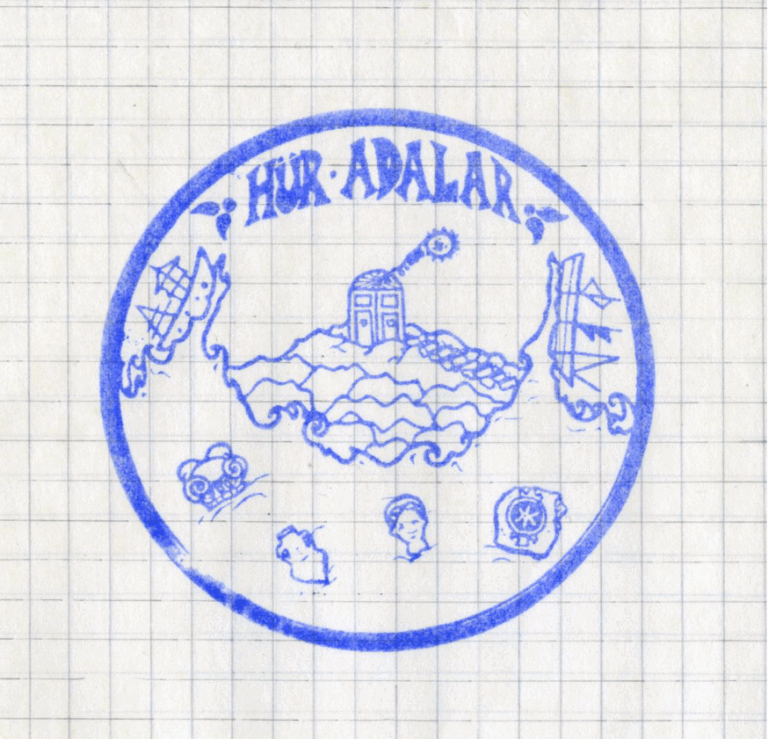
Stamp designed for Hür Adalar by Songül Arslan
Apart from the support it received from the SAHA Foundation, Hür Adalar is mainly self-funded by Fatma Belkıs and her family. Thus, Hür Adalar has the ability to operate independently of production and institutional expectations. This resistance to institutional norms allows Belkıs and participating artists to experiment with activities. For example, Belkıs usually ask the residents to write their bios in an experimental manner the day before they leave the programme, using a language that would not be used in an institution or formal context, even if this renders the bios unusable. This is an attempt to expand the scope of artistic expression and experiment with how artists would talk about their practice if they were not bound by institutional expectations.
In 2025, with the funding from SAHA, Belkıs bought a risograph and now proposes to print a collectively produced zine at the end of each session. The distribution of the zine isn’t a preoccupation as it is merely distributed to the participants themselves, to be spread out or as a souvenir. Similar to other projects of its scale in Turkey, including the residency programme Garp Sessions in Babakale, the will is to lift any financial burden from the artists’ shoulders, and eventually be able to provide transportation and artists fees. Experimenting with the current model, Belkıs aims not to leave the space empty for most of the year. To do so, she’s launching an open call for international artists who either have access to public or private funds to pay for their own travels alongside the expenses of the residency. Their payments would act as ‘pending residencies’, funding the space and giving the opportunity to other artists and cultural workers from where public funds are close to non-existent and private funding is very limited to come to Hür Adalar.
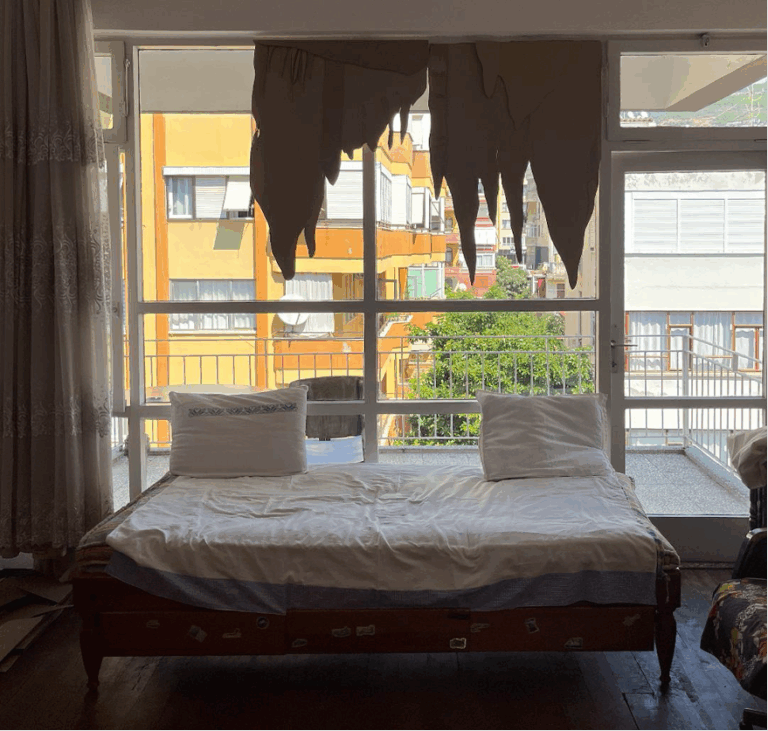
Intervention by Sevgi Ortaç inspired by Damlataş Cave – © Courtesy of Hür Adalar
Hosting Experiments and Memory
sezon is an independent art space in İzmir run by artist Betül Aksu. Betül, who used to live in London, came back to İzmir after the pandemic. Meanwhile, the plot of land that Betül’s grandfather had left to her mother had finally been developed, and the family now owned an apartment there. After receiving the keys from her mother, Betül decided to turn the flat into an art space which she or others could use when needed.
In the recent years, a long of people have left Istanbul and relocated to İzmir due to factors such as increasing living costs or fear of a long-expected earthquake. Consequently, many corporate offices have opened branches in İzmir, drastically changing the city and creating new issues such as increased traffic, skyscrapers piercing the skyline, higher rents, and inadequate infrastructure. Betül set off motivated by a desire to explore the politics and poetics of change, which are very much in line with the city’s changing features.
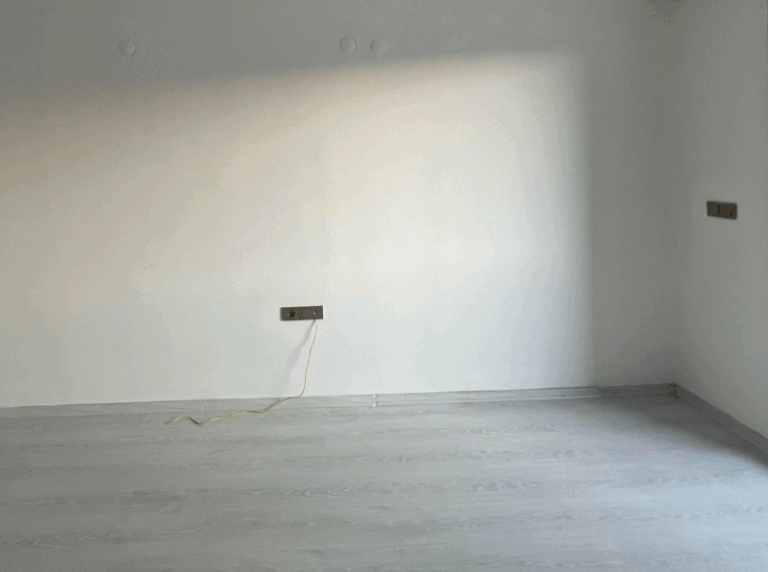
© Betül Aksu
The name sezon—which translates to season in English—fills in the same purpose, e.g. the notion of change and transformation. In line with her own personal journey, Betül wanted the space to reflect the cyclical and seasonal aspect of life as well as its temporality and potential for transformation, despite many supposedly fixed and given conditions. sezon offers a temporary empty space in which people can create their own changes or seasons, safe in the knowledge that these changes are only temporary.
sezon's first exhibition, entitled ‘Before’, was organised in September 2023 and showcased this state of mind. For this exhibition, Betül invited ten artists from İzmir and beyond. She showed them the layout of the flat and asked them what they would like to exhibit and where. Then, their answers were hanged in the spot they had chosen. After this inaugural exhibition, the flat has been used as a residency and exhibition space. Betül even started to collaborate with other initiatives and people in İzmir such as Hayy Open Space.
sezon is partly self-funded, with Betül paying rent to her mother whenever she can. Funding has also been received from bodies such as the British Council and the Goethe Institut, as well as from self-funding residents. Betül has offered the space as a residency to artists with or without funding, as well as to cultural workers at risk, who need a place to stay in İzmir. She explains not requesting production-oriented project proposals or portfolios that demonstrate one’s desirability as an artist. The space is granted based on need, which allows Betül to remain outside of funding narratives and act freely. In an unstructured manner, it creates a space in which people can come together and explore potential collaborations without the pressure to turn everything into an artistic project.
Since November 2024, sezon has hosted the Vranofça Archive, a collective archive of stories from the Vranofça community who migrated from Gorno Vranovci, Yugoslavia to İzmir, Turkey in the 1950s, including Betül’s family. Through short pop-up exhibitions and gatherings, sezon has gradually evolved into a community space for this particular community. This has opened the space up to a wider audience: people from the community have brought their own migration papers and documents, and the archive has begun to grow and transform through the encounters that have taken place in the flat. Betül is currently preoccupied with the question of how the space can be opened up further to transform the archive into a site of memory. The possibility of having a permanent space for the archive is also under discussion. Betül plans to split her time between London and İzmir, but wishes to keep the space open so that other initiatives in the city can use it as and when required.
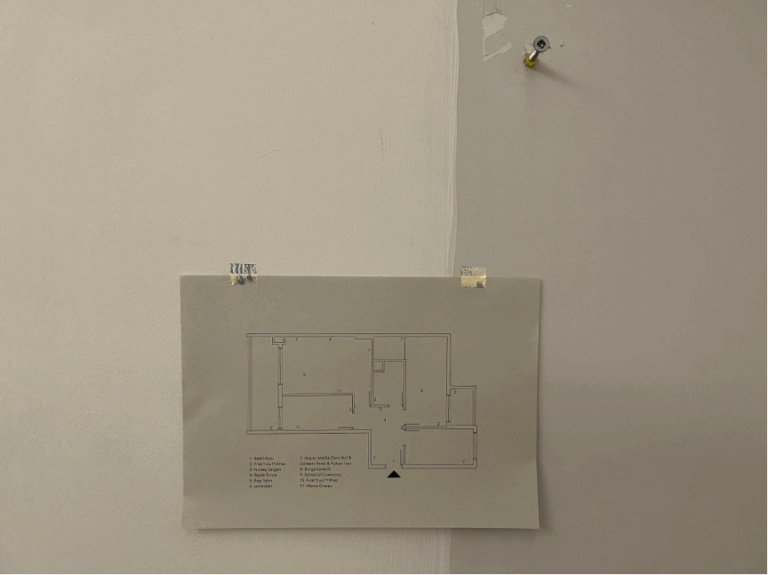
© Betül Aksu
In Turkey, where we are accustomed to finding alternative ways to use existing resources, programmes such as Hür Adalar and sezon demonstrate how we can use spaces we own, acquire, or are lent temporarily for artistic and curatorial purposes. Garp Sessions is also a project that emerged as such and it has been a personal inquiry of mine to think further on how things passed down intergenerationally can enable us to realise projects that do not fit in the existing norms and expectations of the art market, providing convivial spaces for true experimentation.
Published on October 14th, 2025
About the author:
Deniz Kirkali is a curator and writer based between Istanbul and London. She has co-founded topsoil, a transnational curatorial and research collective, and Garp Sessions, a summer residency programme in Babakale, Turkey. She holds a PhD from Goldsmiths University.